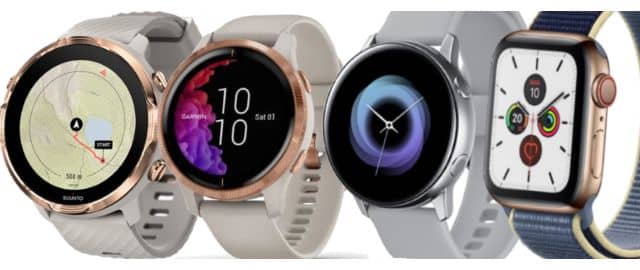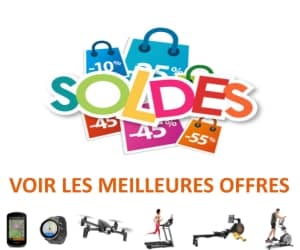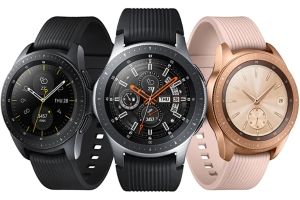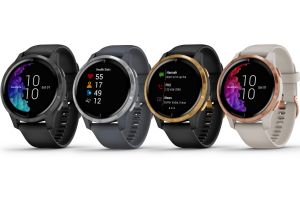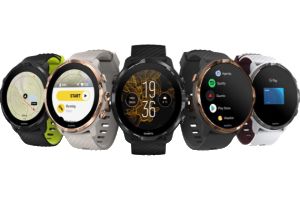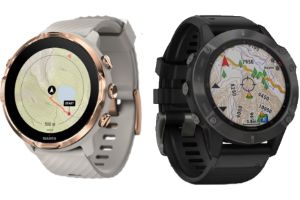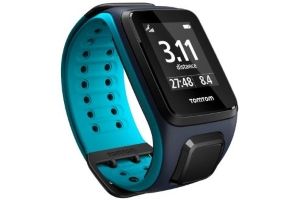- 4 connected and sports watches among the best on the market today
- Comparative prices and physical characteristics
- Autonomy: use limited to short outputs
- Sensors: all well equipped but no compatibility with external sensors
- Functions offered: watches that are more connected than sporty
- Our opinion on the Suunto 7, the Apple Watch 5, the Garmin Venu and the Samsung Galaxy Watch Active 2: which one is the best?
- Where to buy these models
Buy Samsung Galaxy Watch Active 2
Commercial links. Prices are not contractual. Please visit the merchant site.
4 connected and sports watches among the best on the market today
Who is the sports connected watches for?
Connected watches (or Smartwatch) offer intelligent functions useful in everyday life, such as 24-hour health monitoring, assistance in case of an incident, telephony, display of maps and plans, contactless payment solution, music listening, information (weather, calendar, train and plane schedules, reservations, etc.), an intelligent assistant, and much more. They can sometimes be used for sport, but this is not their primary purpose.
Sports watches are designed for sports. They usually incorporate a GPS chip and a heart rate monitor. They offer functions to assist the athlete and monitor performance, sometimes including physiological measurements indicating fitness status, progress, recovery time, etc. Watches for the mountains, the outdoors or for exploration also offer GPS navigation functions for finding your way around or following a programmed route, as well as weather functions.
Sports connected watches, like the 4 we have chosen to compare in this article, are designed for a mixed use: everyday life and sport. They incorporate both intelligent functions that are useful in everyday life and sports functions. They can be worn 24 hours a day, generally have a stylish design and are relatively light.
In this comparison, we have selected 4 recent models, the latest releases of each brand (2019-2020). These watches are among the best connected watches on the market today. They will be of particular interest to people looking for a Smartwatch and practicing an occasional to regular sport. For an exclusively sporting use, for the practice of an intensive sport or for competition, it is better to turn to exclusively sporting watches (see our comparative of cardio-GPS watches).
Suunto 7: combining everyday life and sport with downloadable apps
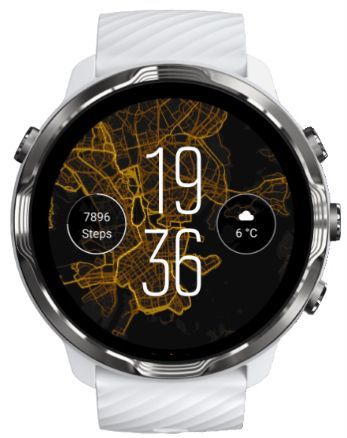
Released in January 2020, the Suunto 7 is the first Suunto watch to run under Wear OS, Google's watch operating system. It offers advanced sports functions, making it an ideal connected watch for people who play sports occasionally or regularly. The advantage of Wear OS is to offer the best of the smart features of the moment thanks to downloadable apps.
It includes topographical maps, a payment solution and allows you to listen to music without a Smartphone. Wear OS gives access to the Google assistant (the watch has a microphone on it to interrogate it), to health monitoring (Google Fit), to access to information (Internet). In terms of sports functions, this watch is similar to the Suunto 5 but with the added mapping. On the other hand, it has a much lower range, does not offer adaptive custom training and has limited GPS navigation.
Read our detailed review and opinion on the Suunto 7
Buy Suunto 7
Apple Watch 5: an all-purpose watch with advanced health monitoring but minimalist sports functions
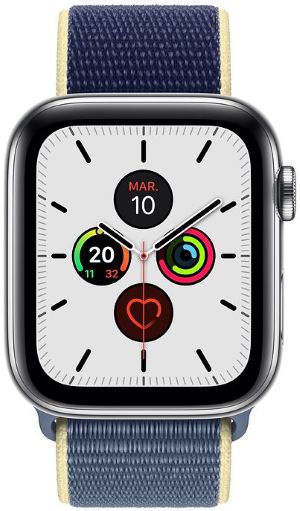
Released in 2019, the Apple Watch 5 (a barely improved version of the Apple Watch 4 released in 2018) brings amazing health monitoring features, including the famous electrocardiogram (ECG), a miniaturized medical device designed to detect certain heart abnormalities. It detects falls, can call an emergency number if needed, offers 4G telephony and access to information without the need for a Smartphone. Equipped with a microphone and speaker, it allows you to query the Google Smart Wizard and get answers to your questions. In short, it's ultra-complete in terms of smart features and health monitoring, not to mention the fact that many apps can be downloaded from the Apple Store. It is elegant and will match all your outfits. It is not the most suitable for sports but it will suffice for occasional sportsmen and women. Warning, it only works with an iOS Smartphone (iPhone).
Read our detailed review of the Apple Watch 5 and our review
Buy Apple Watch 5
Garmin Venu: the watch with payment, mp3 player and advanced health monitoring
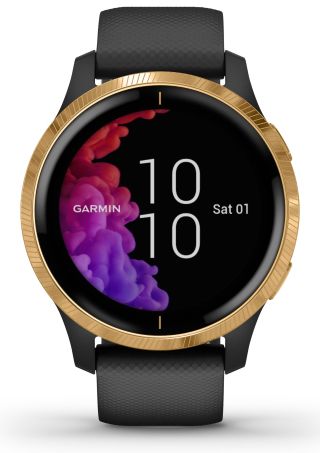
A jewel of technology, this AMOLED touch-screen connected watch offers advanced functions and is a great success. It includes many sports profiles including yoga, skiing, golf, rowing, bodybuilding. It has a Garmin Pay contactless payment system to pay for purchases directly from the watch, an mp3 player and comprehensive health monitoring features. It assesses stress and fitness levels, allows you to load workout programs, loads lively exercises to learn how to do cardio, weight training, yoga and Pilates. It is a serious alternative to high-end watches or Smartwatches (Apple Watch, etc.) for a lower price. The Garmin Venu offers the same features as the Vivoactive 4, a slightly less expensive model without an AMOLED display (Read our detailed review of the Garmin Vivoactive 4).
Read our detailed review of the Garmin Venu and our review
Buy Garmin Venu
Samsung Galaxy Watch Active 2: a connected and sporty watch with optional 4G telephony
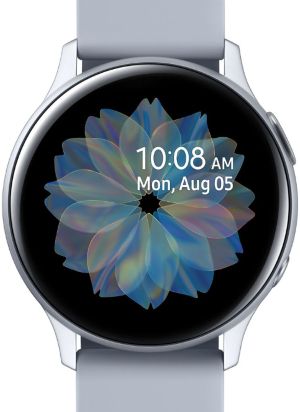
This new model replaces the Galaxy Watch Active with a few new features, including 4G telephony (optional as on the Apple Watch), a digital rotating crown for easier navigation, a built-in speaker, a slightly longer battery life and a Bixby assistant that works in French. The Smartwatch, designed for "active" people, is the connected version of the sportier model, the Galaxy Watch. It offers an elegant design with a superb AMOLED screen without rim (curved edges) and 2 case sizes. It offers sufficient sport functions for the occasional to regular sportsman. In particular, it includes a coach who advises and motivates you to move, manages fractional and your pace. Animated exercises help to learn the movements. His health monitoring is excellent.
Buy the Samsung Galaxy Watch Active 2
Main differences between Suunto 7, Apple Watch 5, Garmin Venu and Samsung Galaxy Watch Active 2
In the comparative table below, we highlight the main differences between the 4 watches. Note the differences in case size (some models are better suited for thin wrists), battery life, and onboard sensors. You will find our opinion at the end of the article as well as a comparative table of the advantages and disadvantages of each model.
| Suunto 7 | Apple Watch 5 | Garmin Venu | Galaxy Watch Active 2 | |
|---|---|---|---|---|
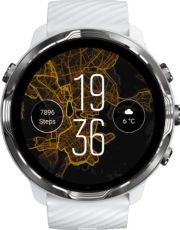 | 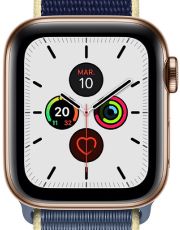 | 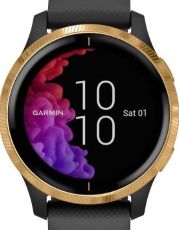 | 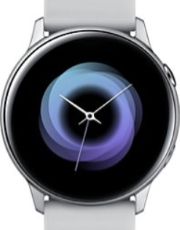 | |
| Price | 479 € | 449 to 579 € | 349 € | 309 to 469 € |
| Weight | 70 g | 30.8 to 36.5 g | 46,3 g | 26 to 44g without bracelet |
| Case Size | 50 mm | 40 or 44 mm | 43.2 mm | 40 or 44 mm |
| Thickness | 15.3 mm | 10.7 mm | 12.4 mm | 10.9 mm |
| Screen size | 1,4" (35 mm) | 34 x 40 mm 38 x 44 mm | 1,2" (30 mm) | 1,2" (30 mm) 1,4" (35 mm) |
| Definition | 454 x 454 px | 324 x 394 px 368 x 448 px | 390 x 390 px | 360 x 360 px |
| AMOLED Screen | • | • | • | • |
| Touch screen | • | • | • | • |
| Colour screen | • | • | • | • |
| Sports profiles | 70+ | 14 | 20 | 40 |
| Autonomy (connected watch) | 2 days | 18 h | 5 days | 45 h |
| GPS | GPS, GLONASS, Galileo, QZSS, Beidu | GPS, GLONASS, Galileo, QZSS | GPS, GLONASS, Galileo | GPS, GLONASS, Beidou, Galileo |
| True multi-sports | • | |||
| Wrist cardio | • | • | • | • |
| 24/7 activity monitoring | Via Google Fit | • | • | • |
| GPS Navigation | GPS track | • | ||
| Barometric altimeter | • | • | • | • |
| mp3 player | Music via app | • | • | • |
| Payment function | • | • | • | Under Android |
| 4G (telephony) | Option | Option | ||
| Colour mapping | • | Via app | ||
| Itinerary generator | ||||
| Assistance in case of a fall | • | • | ||
| Waterproofing | 50 m | 50 m | 50 m | 50 m |
| Requires a Smartphone | Android or iOS | iOS (iPhone) | Android or iOS | Android or iOS |
Comparative prices and physical characteristics
Price: 300 to 600 € depending on the brand, model and finish
The price of these 4 watches is relatively high, from 300 to 600 €. The Suunto 7 is offered at a price similar to the Apple Watch (around €500). Some options, such as 4G telephony (LTE versions) offered on the Apple Watch and Galaxy Watch, and the finish (type of case and strap) add to the price. Garmin offers a model running on a proprietary OS. With fewer smart features than competing models, it is, together with the Galaxy Watch, the best offering in terms of sports features.
Design and structure
We're dealing with some pretty connected watches, each with its own style. The Suunto 7 with its metal crown and one-size case. The ultra-light Apple Watch, with its square case in aluminium, titanium, steel or ceramics an impeccable finish. The Garmin Venu, with a sportier look. The Samsung Galaxy Watch Active 2 with its rimless display and aluminium or stainless steel case and military certification.
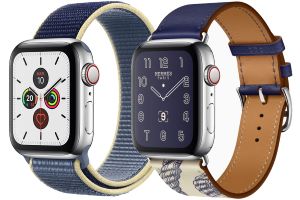
With the exception of Suunto and its one-size watch, the other brands offer 2 case sizes. People with thin wrists will appreciate (see also our comparison of the best GPS cardio watches for women). Also note the thinness of the Apple Watch and the Galaxy Watch (less than 11 mm). Suunto 7 is significantly bulkier and thicker, a regrettable point for a product that is intended to be worn every day.
The look is of course a factor when choosing your watch, knowing that it will be worn all the time, in the city and at work as well as for sport. The diversity and interchangeability of the bracelets is an additional asset. Apple offers the widest range of wristbands in a variety of colours and materials.
The Apple Watch and the Samsung Galaxy Watch are equipped with a speakerphone so that you can make calls (LTE versions) and hear the person you are talking to without the need for Bluetooth headphones. Apart from the Garmin Venu, these watches also carry a microphone that allows you to query the personal assistant (Google assistant, Siri or Bixby (Android only)) or to dictate an SMS.
The screen
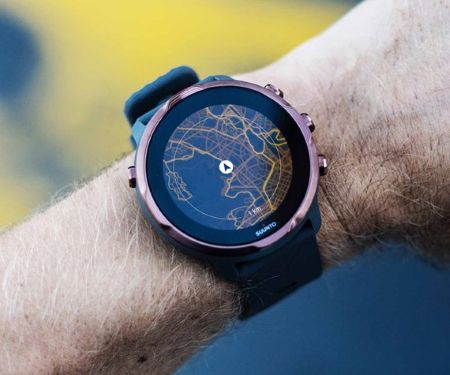
The 4 models offer a color, touch and AMOLED screen (read here our explanations and the advantages of an AMOLED screen). These screens, which equip smartphones and more and more connected watches, offer a rich colour palette (16 million colours compared to only 64 million colours for MIP screens) and thus enable high-quality animations and animated watch faces to be displayed. On the other hand, they consume much more.
The definition (number of pixels) is excellent for all 4 watches, especially for the Suunto 7 (454 x 454 px!) and the Garmin Venu (390 x 390 px). The screen of the Samsung Galaxy Watch Active 2 offers a magnificent rendering.
| Suunto 7 | Apple Watch 5 | Garmin Venu | Galaxy Watch Active 2 | |
|---|---|---|---|---|
 |  |  |  | |
| Price | 479 € | 449 to 579 € | 349 € | 309 to 469 € |
| Weight | 70 g | 30.8 to 36.5 g | 46,3 g | 26 to 44g without bracelet |
| Case Size | 50 mm | 40 or 44 mm | 43.2 mm | 40 or 44 mm |
| Thickness | 15.3 mm | 10.7 mm | 12.4 mm | 10.9 mm |
| Screen size | 1,4" (35 mm) | 34 x 40 mm 38 x 44 mm | 1,2" (30 mm) | 1,2" (30 mm) ou 1,4" (35 mm) |
| Definition | 454 x 454 px | 324 x 394 px 368 x 448 px | 390 x 390 px | 360 x 360 px |
| AMOLED Screen | • | • | • | • |
| Touch screen | • | • | • | • |
| Colour screen | • | • | • | • |
| Glass | Corning Gorilla Glass 3 | Sapphire or glass | Corning Gorilla Glass 3 | Gorilla Glass DX Plus |
| Lunette | Stainless Steel | Stainless Steel | ||
| Microphone | GPS, GLONASS, Galileo, QZSS, Beidu | GPS, GLONASS, Galileo, QZSS | GPS, GLONASS, Beidou, Galileo | |
| Loudspeaker | • | • | ||
| Interchangeable bracelet | • | • | • | • |
Autonomy: use limited to short outputs
Autonomy is not the strong point of connected watches. The AMOLED display consumes much more than a transflective PIM display. The use of the connected functions (music player, map display, etc.) takes up a lot of battery life. On top of that, there is an increased consumption due to the complexity of the operating system (OS). To increase the autonomy, the manufacturers propose to disable the display automatically after a few seconds of inactivity.
The 4 connected watches compared do not offer an energy saving mode for sports use, nor intelligent battery management (Suunto offers it on the Suunto 5 and Suunto 9 but not on the Suunto 7).
| Suunto 7 | Apple Watch 5 | Garmin Venu | Galaxy Watch Active 2 | |
|---|---|---|---|---|
| Watch mode | 40 days | |||
| Connected watch mode | 2 days | 18 h | 5 days | 43 h |
| GPS mode | 12 h | 6 h | 20 h | 10 h |
The Suunto 7 theoretically offers a range of 2 days in connected watch mode (activity monitoring but no sports outings) and 12 hours in GPS mode with heart rate monitoring. It lasts 40 days in "watch" mode (time and battery level display).
The Apple Watch 5 remains faithful to its 18 hours of autonomy, as on the older models, but its screen now remains permanently active (although the function can be disengaged). It lasts about 10 hours in sports use, 6 hours with the use of GPS and optical heart rate monitor and less than 5 hours if we add a 4G use (telephony, Google assistant, etc.).
The Garmin Venu offers 5 days autonomy for use with activity tracking, 20 hours in GPS mode and 6 hours in GPS mode with music playback. Provided that the display is not permanently activated!
Finally, the Samsung Galaxy Watch Active 2 would last 43 hours in connected watch mode and 10 hours in GPS mode, slightly optimistic values according to tests but better than the previous model.
Given their limited autonomy, these connected watches clearly cannot be used for long-duration outings such as ultra-trail races and long hikes. It's borderline if you can use them for a marathon.
Sensors: all well equipped but no compatibility with external sensors
All the watches in this comparison are very well equipped with sensors. They carry a GPS chip, a heart rate monitor on the wrist, a barometric altimeter (which cannot be calibrated manually), a barometer, a compass (except the Samsung Galaxy Watch).
Garmin also offers a thermometer and a pulse oximeter for assessing blood oxygenation (used in the mountains and for sleep analysis) and acclimatization to altitude. Apple comes with an electrical heart rate sensor and an ECG (electrocardiogram) function. Samsung strengthens its optical sensor by using 8 instead of 4.
The weak point of these watches, with the exception of the Garmin Venu, is that they are not compatible with external sensors (foot pod, cadence, speed, power, etc.). The Apple Watch 5 is just about ready to connect a cardio belt. Too bad for watches that are meant to be sporty! Follow-up will therefore be limited, especially for running and cycling enthusiasts.
| Suunto 7 | Apple Watch 5 | Garmin Venu | Galaxy Watch Active 2 | |
|---|---|---|---|---|
| Barometer | • | • | • | • |
| Barometric altimeter | • | • | • | • |
| Manual altimeter calibration | ||||
| Thermometer | • | |||
| GPS systems | GPS, GLONASS, Galileo, QZSS, Beidu | GPS, GLONASS, Galileo, QZSS | GPS, GLONASS, Galileo | GPS, GLONASS, Beidou, Galileo |
| Wrist cardio | • | • | • | • |
| Underwater wrist cardio system | • | • | • | |
| Pulse oximeter | • | |||
| Power | ||||
| External sensor compatibility | No | Cardio belt | Yes | No |
Functions offered: watches that are more connected than sporty
GPS navigation and guidance functions: advantage to the Garmin Venu
GPS navigation (route tracking, route planning, return to the start, navigation to waypoints, etc.) is an essential function for hiking, exploring, trekking but also for organizing a cycling or running trip on unknown trails. With cartography, it's the ultimate.
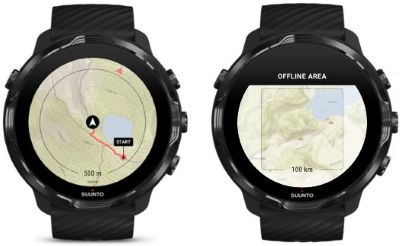
Suunto 7 offers colour topographic maps including heat maps (the most popular routes used by the community, handy for finding a route when you don't know the places). These maps can be viewed offline. They can therefore be consulted in the middle of the mountains, without any network. Unlike Garmin (Fenix 6 Pro, Forerunner 945), these maps are limited in size (50 km x 50 km at the most). The watch charges them automatically, depending on the location of use, but then requires a connection to Wi-Fi or a smartphone that can pick up the network! The touch screen allows you to move the map easily or zoom in and out. However, navigation on the S7 is limited. The watch displays the track but does not provide guidance or a return to the starting point. You will have to do your best to follow the trace displayed on the screen and zoom in if necessary.
The Apple Watch displays maps and can be used as a GPS, provided you have an iPhone and network or purchase the LTE (4G) model. However, beware of battery consumption! You can also find apps dedicated to navigation on the Apple Store.
The Garmin Venu offers advanced GPS navigation but no mapping. It displays the GPS track, allows you to record and follow a route recorded in the watch and retrace your steps. It also offers voice guidance. In addition to these functions, Garmin has generalized on its watches the LiveTrack function that allows them to be tracked on the Internet. The Garmin Venu also offers the GroupTrack function to track other athletes wearing Garmin watches with this feature.
| Suunto 7 | Apple Watch 5 | Garmin Venu | Galaxy Watch Active 2 | |
|---|---|---|---|---|
| GPS Navigation | + | +++ | ||
| Back to the start | • | |||
| Integrated path generator | ||||
| On-board heat cards | • | |||
| Cartography | • | Via App | ||
| Compass | Via App | • | • |
Sports profiles and functions
Sports profiles are multiplying on watches, but sometimes it's only the name of the profile that changes. Garmin offers fewer profiles than Suunto, but they are relevant for each sport (counting the number of ski runs, number of rowing strokes and rowing cadence, running dynamics for running, etc.) and others can be downloaded from Garmin Connect. The watch also knows how to detect certain activities (it recognises the type of sport practised). Suunto, for its part, offers 39 activities on its S7, 7 of which are detectable.
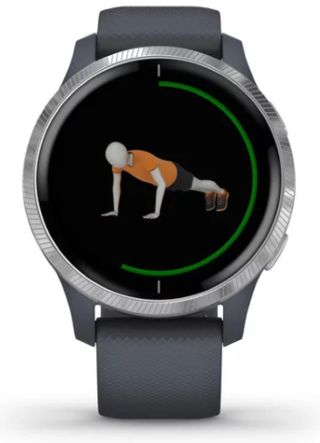
The advantage of the Garmin Venu is that it can be coupled with certain external sensors (cardio belt, cadence and speed sensors, foot pod). Other watches do not offer this possibility (except for the Apple Watch which allows you to connect a cardio belt) which limits the possibilities of training. The cardio belt is, for example, indispensable for precise heart rate measurement, especially for fractional or aquatic use.
In addition, Garmin offers numerous functions to help the athlete: programming of training sessions that take into account previous outings, split sessions, running against an opponent or against oneself, estimating running time, programming alerts, setting goals, etc. These functions, combined with physiological measurements, offer powerful tools for demanding sportsmen and women, even if, on this connected model, the functions remain limited (The Venu is at the lower end of the range of Garmin sports watches).
Apart from the Apple Watch, these watches are not true multi-sport watches. You can't chain activities together without stopping the recording and restarting a new exercise. This limits their use for activities such as triathlon or swim-run.
| Suunto 7 | Apple Watch 5 | Garmin Venu | Galaxy Watch Active 2 | |
|---|---|---|---|---|
| Sports profiles | 70+ | 14 | 20 | 40 |
| Triathlon | • | |||
| Golf | • | |||
| Training programming | • | |||
| Interval training | • | • | • | |
| Training follow-up | ||||
| Running | ||||
| Racing dynamics (e.g. cadence, stride length...) | ||||
| Interval training assistance | ||||
| Race pace | • | • | • | |
| Stroke power | ||||
| Tower comparison | • | |||
| Speed and cadence sensor support | • | |||
| Race Time Predictor | • | |||
| PacePro (assistance in the ribs) | ||||
| Bike | ||||
| Speed | • | • | • | |
| Average real time speed | • | • | • | |
| Rate sensor compatibility | • | |||
| Power Sensor Compatibility | ||||
| Bicycle paths | ||||
| Altitude profile | ||||
| Strava Live segments | • | |||
| Swimming | ||||
| HR measurement and monitoring | • | • | • | |
| Swimming rhythm in pool and distance | • | • | • | • |
| Open water swimming rhythm and distance | • | |||
| Swimming type detection | • | • | • | |
| Swimming efficiency (SWOLF) | • | |||
| Swimming time per length (pool), laps, total | • | • | ||
| Cadence and number of movements | • | • | ||
| HR measurements underwater | • | • | • | |
| Outdoor | ||||
| Route registration | • | • | • | • |
| Slope profile | ||||
| Real-time trace | • | • | ||
| Navigating to a POI | • | |||
| Evaluates altitude acclimatization | ||||
| ETA (estimated time of arrival) | ||||
| Heat maps | • | |||
| Heat maps on the watch | • | |||
| Itinerary generator | ||||
| Vertical speed | • | |||
| GPS Altitude | • | • | ||
| Total ascent/descent | • | • | • | |
| Thermometer | • | |||
| Weather | Via app | Via app | • | • |
| Temperature | Via app | • | ||
| Sunrise/sunset times | Via app | |||
| Storm warning | Via app | |||
| Other | Animated exercises | Compatible fitness equipment via NFC (stepper, elliptical, bike) Running Coach Animated exercises |
Physiological measurements
Physiological measurements help the athlete to manage his training and optimize his performance, even predicting a running time according to the distance to be covered, the level of training and the athlete's physical condition. The watch can estimate the VO2max, stress level, lactic threshold and more. At Garmin, these estimates are provided by Firstbeat's algorithms, but the Venu offers only 5 measures (compared to 18 on the Fenix 6). At Suunto, this is delegated to Google via Wear OS. For sport, it is the VO2max and possibly the level of body energy (Body Resource at Garmin) that are interesting to evaluate its progress (performance) and its level of recovery.
| Suunto 7 | Apple Watch 5 | Garmin Venu | Galaxy Watch Active 2 | |
|---|---|---|---|---|
| Calories burnt | • | • | • | • |
| VO2max | • | |||
| Race Time Predictor | • | |||
| Training effect | ||||
| Lactic threshold | ||||
| Recovery time | • | • | • | |
| Training load | ||||
| Training status | ||||
| Stress Level | • | • | ||
| Breathing frequency | • |
Connected functions
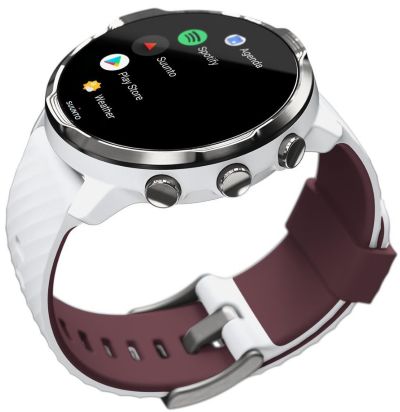
While Garmin used to have the competitive edge by offering many advanced connected features, this is no longer the case today. Suunto and Apple now offer endless possibilities with downloadable apps designed for the Wear OS and Apple Watch OS, environments that allow anyone to develop their own application. On the Garmin Venu, you'll have to make do with the features that Garmin is willing to offer. At Samsung, the number of apps offered in the Galaxy Store is still very small.
Suunto 7 has a microphone and allows you to consult the Google Smart Wizard. You can ask the watch a question and get an answer, as long as it is connected to a smartphone and the network is available. The watch allows you to access services on the Internet or on your Smartphone (agenda, weather, calendar, reservations, consulting flight schedules, etc.). It does not have an mp3 player but a dedicated app allows you to listen to music. A payment function is available. You can also reply to SMS messages by dictating a message. All features offered by Garmin (except those using the oximeter) can potentially be offered on Suunto 7 as long as a dedicated app exists in the Google Play Store.
At Apple, the situation is similar. The watch has a microphone, a smart assistant and apps to download from the Apple Store. The watch is therefore very evolutionary and already very rich in possibilities.
At Garmin, the functions are numerous but limited. The Venu features an mp3 player with streaming via Spotify, Deezer or Amazon Music, a payment solution, LiveTrack and GroupTrack functions, a fall detection function and automatic call of an emergency number in case of a fall, remote device control (VIRB 3D camera, etc.), an incident detection function (e.g. a fall) and an emergency number to call in the event of an incident with transmission of GPS coordinates. The watch displays smart notifications (emails, calls and SMS) and offers the possibility to reject incoming calls from a smartphone or to send predefined SMS messages.
Samsung offers a still poor library of downloadable apps. The health functions are numerous. We will have to wait until the bookstore gets richer to compete with Apple and Suunto.
| Suunto 7 | Apple Watch 5 | Garmin Venu | Galaxy Watch Active 2 | |
|---|---|---|---|---|
| MP3 Player | Via app | • | • | • |
| Contactless payment | • | • | • | • |
| Assistant (Google, Bixby, etc.) | • | • | • | |
| Downloadable apps/widgets | • | • | • | • |
| Live Track | • | |||
| Group Track | • | |||
| Fall detection | • | • | ||
| SOS support/call | • | • | ||
| Object control (camera, etc.) | • | • |
Activity monitoring
The 4 watches offer classic activity monitoring functions (steps, distance, climbed floors, sleep quality). Apple and Garmin offer the most comprehensive health monitoring features. At Suunto, these functions are delegated to Google Fit and at Samsung, the Samsung Health application takes care of them.
| Suunto 7 | Apple Watch 5 | Garmin Venu | Galaxy Watch Active 2 | |
|---|---|---|---|---|
| Distance | • | • | • | |
| Number of steps | • | • | • | • |
| Calories | • | • | • | • |
| Climbed floors | • | • | • | |
| Detailed sleep analysis | • | • | • | • |
| Stress | • | • | ||
| Intensive Minutes | • | • | ||
| Nutritional monitoring (water, caffeine, etc.) | • | • | ||
| Menstrual cycle | • | • |
Our opinion on the Suunto 7, the Apple Watch 5, the Garmin Venu and the Samsung Galaxy Watch Active 2: which one is the best?
Connected functions: advantage to Apple Watch and Suunto 7
We are dealing with 4 excellent connected and sporty watches, the best on the market to date. In terms of smart features, the Apple Watch and Suunto 7 seem to us to be the most complete. In addition, Apple and Samsung offer more scalability thanks to Wear OS and Apple's Watch OS. The Garmin Venu also offers interesting features that will satisfy most users, especially sports users, thanks to its connected functions designed to make the sportsman's life more enjoyable (music, payment, assistance in case of incidents, etc.). In addition, Apple and Samsung offer LTE models with 4G connectivity, which allows access to telephony and remote functions (information, mapping, music, etc.) without the need for a smartphone or Wi-Fi nearby.
Sports features: Garmin and Suunto in the lead
In terms of sporting functions, these 4 watches remain limited.
Autonomy, on the one hand, is the black point of these models. It limits the use of the watch with GPS to only a few hours, not enough for long outings (ultratrail, long hikes or even marathon). Only the Garmin Venu isn't doing too badly with its 20 hours of autonomy in GPS mode.
On the other hand, sports functions are limited. No external sensors can be connected (except at Garmin and, at Apple, the possibility of connecting a cardio belt). Therefore, there will not be any advanced monitoring (cadence, speed, power or even heart rate in swimming and for fractional swimming). Performance monitoring is minimalist. No GPS navigation functions (except on the Garmin Venu). Physiological measurements are absent or rare. Even the Suunto 7, which benefits from all the Suunto experience, offers only the minimum sports package, whereas one might have expected it to offer the fairly comprehensive features of the Suunto 5.
Garmin and Suunto are the best offer in terms of sports functions. For more elaborate sports functions, opt for a purely sports watch (see our comparisons best running watches, best watches for trekking, best triathlon watches).
The advantages of each model
Suunto 7: for everyday life and sport
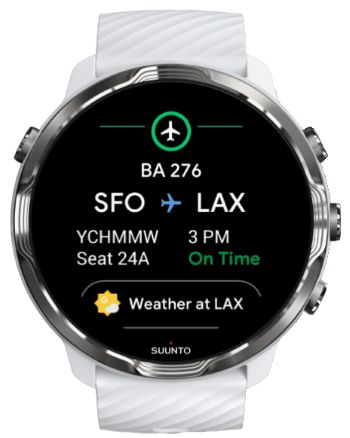
The Suunto 7, with its intelligent functions that make it similar to an Apple Watch (but much less elegant in our eyes and much larger) will appeal to people who are primarily looking for a connected watch for everyday life and who, in addition, want to be able to use it for sports.
While it benefits from all Suunto's experience in terms of sports functions, it has a number of limitations that can be prohibitive for many sportsmen and women. Its functions are less developed than those of other Suunto watches (Suunto 5, Suunto 9). Its autonomy is too low for some sports (ultra-trail, hiking more than 5-6 hrs). It does not allow the connection of external sensors, such as a cardio belt. The training possibilities are therefore limited. It could be a good outdoor watch thanks to the onboard maps and its heat maps. Unfortunately, navigation is limited (no route tracking). As for physiological measurements, they remain marginal. In short, out of the three characteristics that make the strength of the brand (autonomy, reliability and advanced outdoor functions), two are not there.
Its interest remains the use in the city with sports functions much better than the classic Smartwatch (Apple Watch, Samsung Galaxy Watch, Garmin Venu) and a superb screen. Aside from its bulky design and a little too sporty for the city, it will appeal to people who would like to wear an Apple Watch but only have an Android smartphone (also works with an iPhone).
Apple Watch 5: for its elegance and advanced smart features
The Apple Watch is in our eyes the most elegant of the 4 watches in this comparison, as long as you like the square case! Today it is one of the best-selling connected watches in the world. Be careful, it only works with an iOS device (iPhone for example). The offer (case and bracelet materials, finishes) is the widest. It will match any outfit and can be worn without blushing in the city and at work. It's hard to tell the difference with a jewellery watch. It is appreciated by non-athletes who want to lead a healthier life or who are looking for motivation to move. For more advanced sports use, it is better to invest in a watch dedicated to sport.
Garmin Venu: the right compromise for sportsmen (functions, autonomy)
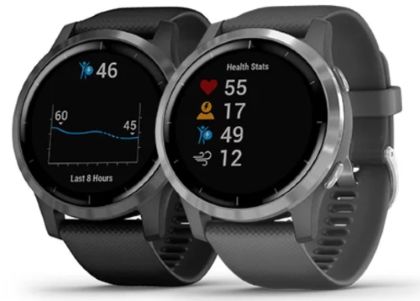
It's the watch with the most functions for sportsmen (even if the model is at the bottom of the Garmin sports range), full GPS navigation and a good range. It offers animated exercises (squats, push-ups, pilates, etc.) to learn the movements. On the other hand, its connected features, while very rich, are limited to what Garmin is willing to offer. Moreover, no evolution is to be hoped for, unlike the watches embedding Wear OS or Watch OS. It will suit people looking for a versatile watch with occasional to regular sports use.
Samsung Galaxy Watch Active 2: for its elegance and intelligent functions
This watch offers a nice design, complete intelligent functions including the Bixby assistant now available in French and a fluid and pleasant to use interface thanks to the digital crown. His widgets are customizable. It offers an ultra-complete health monitoring. It is a good watch for everyday life and for occasional sports use. The less initiated will appreciate the sports coach, the animations to learn how to do the exercises well (squats, push-ups, etc.) and the automatic counting of repetitions (weight training, squat, etc.). Its autonomy is low. It's also a shame that the Samsung Store is still poor in downloadable apps. It will be more suitable for everyday use with an occasional bit of sport. It does not require the use of a Samsung smartphone.
| Weaknesses | Strong points | |
|---|---|---|
| Suunto 7 | Sporty look, bulky model Low battery life No external sensors | One of the best for its sports features Colour and heat maps Number of apps downloadable under Wear OS Google Assistant Live GPS trace Training Peaks |
| Apple Watch 5 | Low battery life Limited sports use Compatible only with iPhone | Elegant design and numerous models and bracelets 2 case sizes Number of intelligent functions under Watch OS Ultra-complete health monitoring functions 4G telephony (optional) |
| Garmin Venu | 1 case size only | Ultra-complete health monitoring Good autonomy Animated exercices Sports coach SOS calls |
| Samsung Galaxy Watch Active 2 | Low battery life Limited sport tracking Low number of Apps in Samsung Store | Elegant design 2 case sizes Complete health monitoring Personal Coch 4G phone (optional) Digital crown and easy touch navigation |
How to choose between the 4 watches
For sports, it's best to turn to Garmin and Suunto. For intelligent functions, the Apple Watch and Suunto 7 are currently the best provided.
| Features | Suunto 7 | Apple Watch 5 | Garmin Venu | Galaxy Watch Active 2 |
|---|---|---|---|---|
 |  |  |  | |
| Price | $$$$ | $$$$ | $$$ | $$$ |
| Elegant design | •• | •••• | ••• | ••• |
| Fits thin wrists | ••• | •• | ••• | |
| Autonomy | • | • | •• | • |
| Sports features | ••• | • | ••• | • |
| Intelligent features | •••• | •••• | ••• | ••• |
| Useful functions | On-board mapping, music, payment | Music, payment, ECG, telephony | Music, payment, pulse oximeter... | Music, payment, telephony |
| Compatible with external sensors | • | |||
| Suitable for running | ••• | •• | ••• | •• |
| Adapted to the mountain | ••• | • | ••• | •• |
| Suitable for swimming | ••• | • | •• | •• |
| Suitable for cycling | •• | •• | •• | • |
| Suitable for outdoor use | ••• | •• | ••• | • |
| Suitable for triathlon | • |
Where to buy these models
These watches are available on the internet. Discover these models at our partners and take advantage of our coupon codes.
Buy Samsung Galaxy Watch Active 2
Commercial links. Prices are not contractual. Please visit the merchant site.
These articles may also interest you
Apple Watch 5 : un écran allumé en permanence
Samsung Galaxy Watch: the connected watch that rivals the Apple Watch
Garmin Venu : une montre connectée avec écran AMOLED et suivi complet de la santé
Suunto 7: a connected and sports watch with cartography running under Wear OS
Suunto 7 versus Garmin Fenix 6 Pro: the differences, which one to choose?
Photo credit : Fotolia.com. This article contains commercial links.

